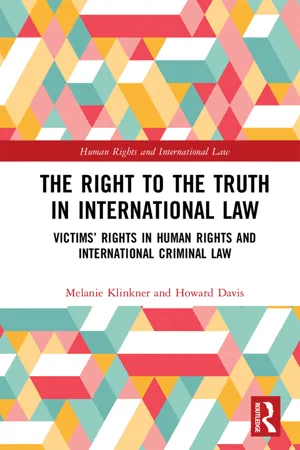
The Right to The Truth in International Law
Victims' Rights in Human Rights and International Criminal Law
Melanie Klinkner, Howard Davis
- 254 páginas
- English
- ePUB (apto para móviles)
- Disponible en iOS y Android
The Right to The Truth in International Law
Victims' Rights in Human Rights and International Criminal Law
Melanie Klinkner, Howard Davis
Información del libro
The United Nations has established a right to the truth to be enjoyed by victims of gross violations of human rights. The origins of the right stem from the need to provide victims and relatives of the missing with a right to know what happened. It encompasses the verification and full public disclosure of the facts associated with the crimes from which they or their relatives suffered. The importance of the right to the truth is based on the belief that, by disclosing the truth, the suffering of victims is alleviated.
This book analyses the emergence of this right, as a response to an understanding of the needs of victims, through to its development and application in two particular legal contexts: international human rights law and international criminal justice. The book examines in detail the application of the right through the case law and jurisprudence of international tribunals in the human rights and also the criminal justice context, as well as looking at its place in transitional justice. The theoretical foundations of the right to the truth are considered as well as the various objectives appropriate for different truth-seeking mechanisms. The book then goes on to discuss to what extent it can be understood, constructed and applied as a hard, legally enforceable right with correlating duties on various people and institutions including state agencies, prosecutors and judges.
Preguntas frecuentes
Información
1 The need for truth
Introduction
Victims’ need for truth
- The return of human remains is necessary to provide opportunities for commemoration practices, funerals and – it is hoped – some sense of healing or closure;
- A death certificate may be required for insurance purposes to safeguard the livelihood of the family;
- Information as to the events that led up to the disappearance may explain the absence of a father as well as restoring basic human dignity to the disappeared and the family that is left (though the truth may also have undesired effects in evidencing previously not known family ties, for example);
- Understanding and investigating the fate of lost children may work towards answers, accountability and criminal justice efforts; documenting the patterns of violence and disappearance not only serves as a record of the human rights abuse but may lead to finding forcibly disappeared people who may still be alive.